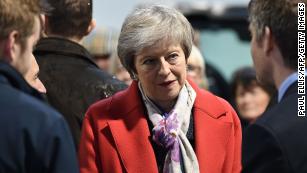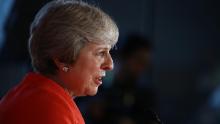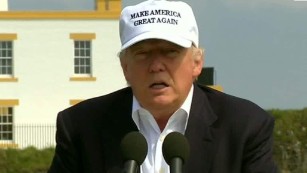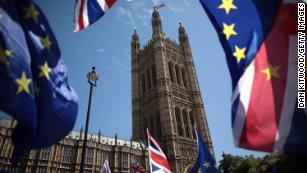The UK government says its Brexit deal will hurt the economy
It's official: The British government's plan for leaving the European Union will be bad for the economy.
The government published a report Wednesday that outlines the economic costs associated with a range of Brexit scenarios. The Bank of England followed later in the day with its own assessment.
The United Kingdom would be worse off under all scenarios studied by the government. Officials did not estimate the precise impact of the deal Prime Minister Theresa May has negotiated with the European Union, but even in the best case it too will mean a weaker economy than remaining in the bloc.
"It is true that the economy will be very slightly smaller, but if we do the deal in the way that the prime minister has set out and negotiated, that impact will be entirely manageable," UK Treasury chief Philip Hammond told the BBC.
The official estimates underscore the harsh economic reality of Brexit: Under any scenario, leaving the European Union will make Britain poorer than staying in.
"If you look purely at the economics, remaining in the single market would give us an economic advantage," Hammond said.
The Bank of England said that May's plan could result in new trade barriers that would cause the UK economy to be 0.75% smaller than currently forecast in 2023. If she can negotiate a future trade relationship with the European Union that does not include customs checks or regulatory barriers, the economy could be 1.75% larger.
May defends Brexit deal as Trump casts doubt on UK ability to trade with US
There are just four months to go until Brexit, and it's still not clear whether May can deliver an orderly departure from the bloc.
The legally-binding divorce deal she has negotiated would give business much-needed certainty about the next two years.
But she still needs to secure approval from a skeptical parliament, and a much looser agreement on the trading relationship after the transition period provides very few details.
Analysis commissioned by a group campaigning for a second referendum showed the UK economy would be 4% smaller by 2030 under May's deal than it would otherwise have been. The National Institute for Economic and Social Research said on Monday that new trade barriers would make it difficult to sell services from the United Kingdom and discourage investment.

Prime Minister Theresa May is trying to sell her Brexit plan to a skeptical parliament.
If May's plan fails, potential alternatives include crashing out of the European Union without a deal, a second referendum or a general election in Britain.
"The important thing ... is to keep trade flowing as much as we can," Hammond told Sky News.
Forecasts assume a US-UK trade deal
May's plan includes a transition period during which most trading rules for companies will remain the same. It would also mean a close relationship with the European Union on trade in financial services, and broad cooperation on transportation and energy.
The government's estimates are also based on other assumptions, including Britain's ability to strike "ambitious" free trade deals with major economies including the United States. That's far from guaranteed.
The UK is staring down the barrel of a recession if Brexit is botched
Economists say the worst possible outcome would be a chaotic Brexit. Crashing out of the European Union would sink the UK economy into recession, analysts have warned.
'No-deal' Brexit worse than 2008
The government said that leaving without a deal would result in the UK economy being 7.7% smaller 15 years after Brexit. That's compared to current trading arrangements, and assumes no change in immigration. The damage would be even greater if net migration from the European Union dropped to zero, the government said.
Some key sectors of the economy would be especially hard hit by a messy Brexit. Official estimates show that the auto, chemicals and pharmaceutical industries, which trade heavily with the European Union, would be more than 20% smaller over the long run.
The Bank of England warned in its report that a disorderly Brexit would cause the UK economy to contract by 8%. The value of the pound would slump by as much as 25% and home prices could plummet 30%.
The economic fallout would be worse than Britain suffered because of the global financial crisis.
The Confederation of British Industry said the government report shows that failing to secure a deal is not an option.
"It surely puts to bed some of the more far-fetched ideas that a hard landing Brexit will not seriously hurt the economy," said Rain Newton-Smith, the lobby group's chief economist.
News Courtesy: www.cnn.com













